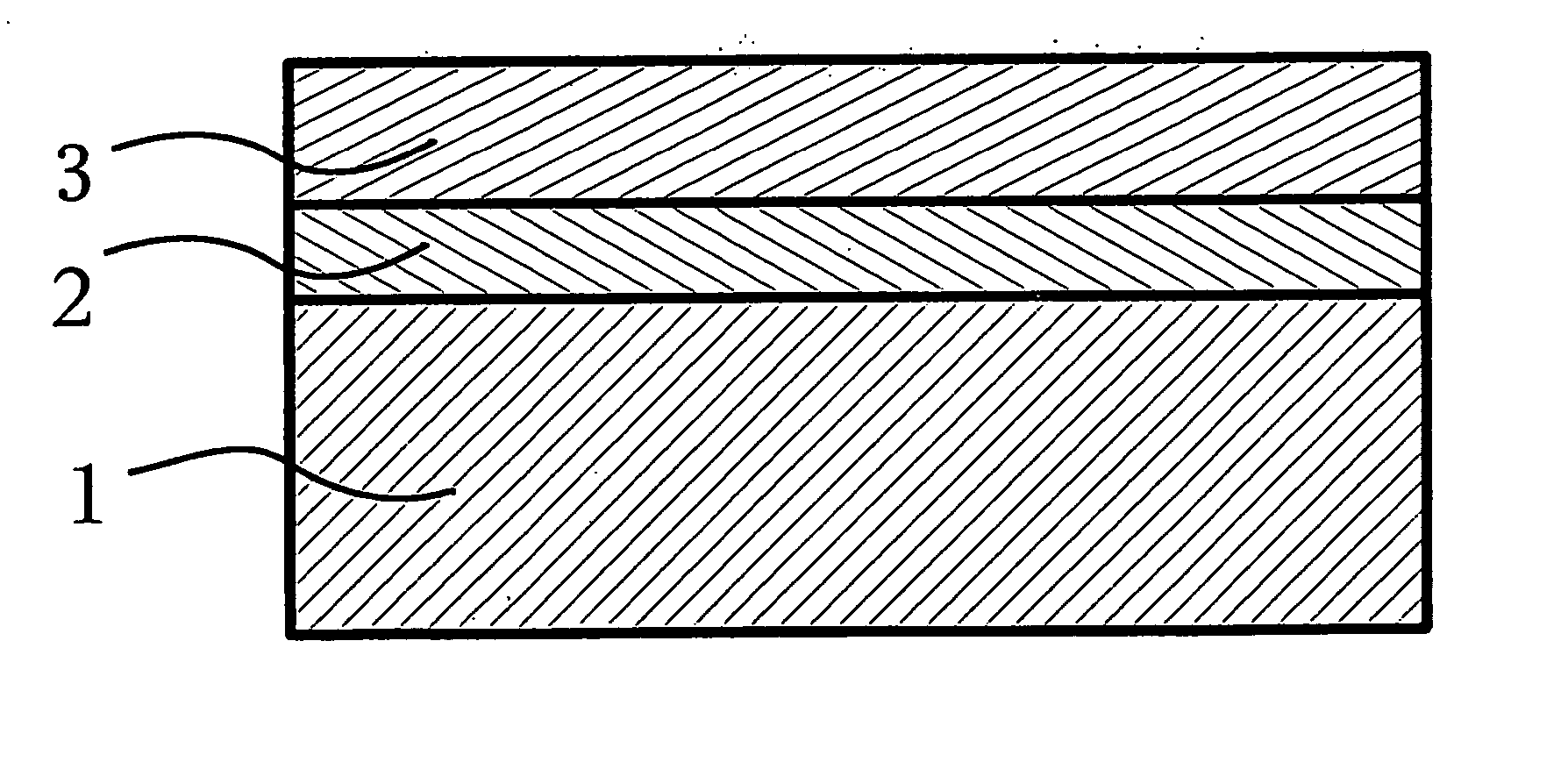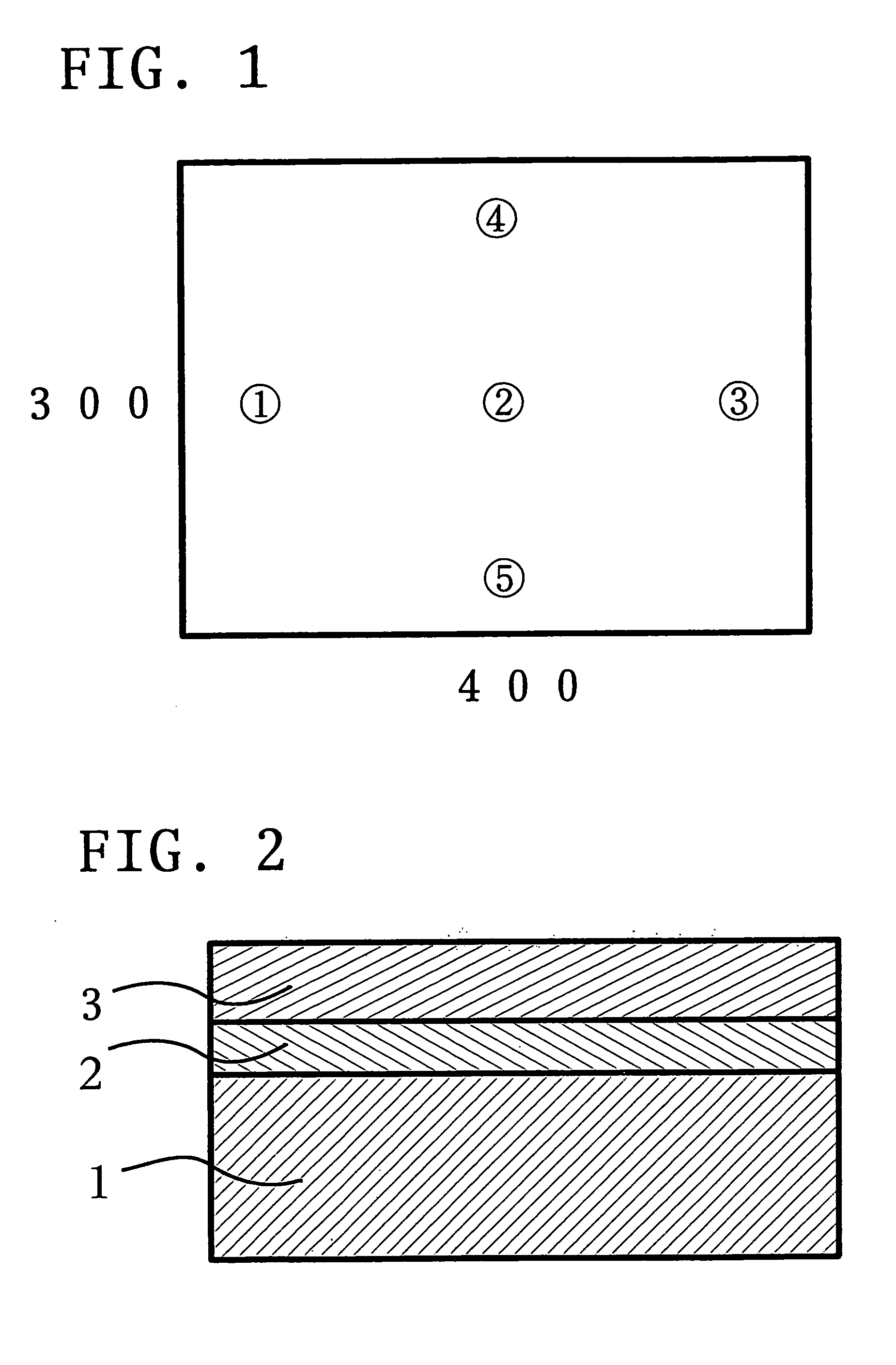Protective coat and method for manufacturing thereof
a protective coat and coating technology, applied in the field of protective coats, can solve the problems of difficult to obtain the desired composition, difficulty in obtaining the desired composition, and uncertainty in the quality of the product, and achieve the effect of preventing the deterioration of film properties and stable el luminescence properties
- Summary
- Abstract
- Description
- Claims
- Application Information
AI Technical Summary
Benefits of technology
Problems solved by technology
Method used
Image
Examples
example 1
Method of Experiment
Polyethersulfone film (manufactured by Sumitomo Bakelite Co., Ltd., SUMILITE FST-5300) (hereunder, referred to as “PES”) was input into a sputtering vacuum chamber, evacuated to 10×10−5 Pa, and maintained in that state for 15 hours to form a barrier film.
Film formation conditions were as follows: Target material: Si3N4 (manufactured by Toshima Seisakusho) Ar / N2: 400 sccm / 10 sccm (40:1) Film formation pressure: 5 mTorr Applied power: 4.3 kW Film formation temperature: unheated (approximately 110° C.) Film thickness: 3000 A Conveying speed: 58 mm / min Overcoat layer: Nippon Steel Chemical Co., Ltd., ph5 Gas monitor during film formation: Quadrupole mass spectrometer (STADM-2000) manufactured by ULVAC Inc. Three conveying carriers were used (first carrier: for ESCA (Si wafer / film); second carrier: measurement of film thickness, transmittance (glass); third carrier: (barrier measurement); all in the same batch)
(Experiment Results)
The results show in-p...
referencial example 1
Film formation was conducted in the same manner as in Example 1, with the exception of employing a film thickness of 500 A, and a conveying speed of 290 mm / min.
PES film was used as a substrate, and in the same manner as shown in FIG. 1, evaluation of in-plane composition distribution, transmittance distribution and in-plane barrier distribution was conducted. The results are shown below.
TABLE 2(Measurement results: nitrogen only introduced, 500 A)BarrierBarrierCompositionTransmittanceFilmpropertyproperty(Si / O / N)(%)thickness(WTR)(OTR)1100 / 170 / 297500 A0.550.32100 / 172 / —98500 A0.610.43100 / 175 / —99500 A0.750.554100 / 173 / —98500 A0.620.355100 / 174 / —99500 A0.620.37
A favorable value was not achieved for barrier properties, and in-plane inconsistencies existed.
Further, regardless of the introduction of only Ar and nitrogen gas, the results were the same in that the composition was mostly SiO2 and nitriding did not occur.
referencial example 3
In order to incorporate a nitrogen component included in the target material into a film under the conditions described in Control 1 (nitrogen / oxygen=8.5), film formation was conducted by raising the RF power (4.5 kW) and increasing the Ar flow ratio (Ar / N / O:400 / 8.5 / 1) so that a transmittance of 85% could be maintained.
TABLE 5(Measurement results: nitrogen and oxygen (mainly nitrogen)introduced, 3000 A)BarrierBarrierCompositionTransmittanceFilmpropertyproperty(Si / O / N)(%)thickness(WTR)(OTR)1100 / 180 / 10833000 A0.690.222100 / 182 / 8853000 A0.750.253100 / 186 / 2893000 A0.810.374100 / 183 / 4873000 A0.730.275100 / 184 / —833000 A0.740.28
As shown in Table 5, although nitriding was observed, it was of an insufficient amount.
PUM
| Property | Measurement | Unit |
|---|---|---|
| distance | aaaaa | aaaaa |
| voltage | aaaaa | aaaaa |
| brightness | aaaaa | aaaaa |
Abstract
Description
Claims
Application Information
 Login to View More
Login to View More - R&D
- Intellectual Property
- Life Sciences
- Materials
- Tech Scout
- Unparalleled Data Quality
- Higher Quality Content
- 60% Fewer Hallucinations
Browse by: Latest US Patents, China's latest patents, Technical Efficacy Thesaurus, Application Domain, Technology Topic, Popular Technical Reports.
© 2025 PatSnap. All rights reserved.Legal|Privacy policy|Modern Slavery Act Transparency Statement|Sitemap|About US| Contact US: help@patsnap.com


